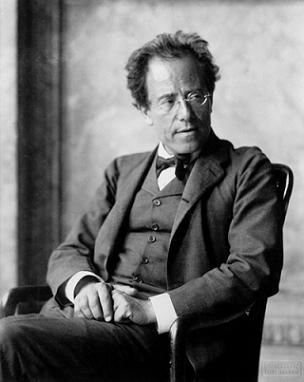Weekend Pick: Free Non-Denominational Resurrection
By Alexander Hough in Arts & Entertainment on Aug 19, 2010 6:00PM
Ah, the bell tolls for summer: shortening days, screaming locusts, and now the Grant Park Music Festival is set to close its 2010 season this weekend with performances of Gustav Mahler's Second Symphony on Friday and Saturday night.
Mahler's massive work (note to those unfamiliar with his music: "Mahler" and "massive" are redundant) is subtitled "Resurrection." While nominally religious, the symphony is decidedly not a Christian paean, although searching for the exact meaning of this resurrection in question is complicated by Mahler's ambiguous, ambivalent religious identity.
Mahler, born to a Jewish family in Bohemia in 1860, identified as Jewish until his conversion to Catholicism in 1897. The conversion is generally seen as a move prompted by politics rather than faith, and for good - and well-documented - reasons. Mahler, a talented conductor, found success on the podium prior to writing the bulk of his music. He bounced from post to post at various spots around central Europe, in tenures that were relatively short due to a combination of ambition and being a notoriously tyrannical leader. His ultimate goal was to direct the Vienna Court Opera, although Mahler flat-out wouldn't have be considered for the job if hadn't converted. Two months after his conversion, he got the gig, and six months after that he became the Opera's director.
However, the Second Symphony was written between 1888 and 1893, well before all of that. While ideas of redemption and everlasting life didn't originate 2,000 years ago, in Europe the idea of resurrection would've been inextricably linked with Jesus. And then there's the symphony's scherzo, which is based on a separate piece Mahler wrote using an excerpt about St. Anthony of Padua from the German folk poems "Des Knaben Wunderhorn". In addition to the Christian elements from the Second, his Third Symphony, also composed prior to conversion (1893-1896), contains text from "Wunderhorn" that explicitly extols Jesus.
There's no easy way to explain away these references. Mahler was in no way a devout Catholic, and later in life he voiced regret for abandoning Judaism. However, his music, at its most elemental, is SINCERE music, and this wasn't a case of side-stepping persecution by feigning faith. But to a large degree, getting caught up in the Christianity aspect misses the point of the music. The Second Symphony, like most of Mahler's work, is intensely personal. The inspiration for the piece was a room full of flowers that greeted Mahler after conducting an opera, which induced a recurring vision of his own funeral. This vision led him to write a piece called "Totenfeier" ("Funeral Rite"), a terrifyingly brutal 20-odd minutes that became the Second Symphony's first movement.
Mahler wrote his own notes to accompany the piece that speak in universal terms - the second movement is a daydream following the funeral, the third is a return to life's troubling reality - and religious terms - the text-based fourth and fifth movements are about faith in God, final judgment, and an ultimate blissful transcendence. But given Mahler's obsession with his own death - something that weighed on him throughout his life - it's impossible to hear what follows the first movement as anything but Mahler's internal struggles and triumphs.
Choosing a text for the redemptive final movement was an important decision that Mahler agonized over. If anything speaks to personal rather than Christian nature of the Second, it's Mahler's revealing quote about this search for text that Dr. Richard Rodda includes in the program notes he wrote for the Grant Park Music Festival: "My experience with the last movement of my Second Symphony was such that I literally ransacked world literature, even including the Bible, to find the redeeming word." That's right - the Bible was the last place Mahler looked for words about resurrection.
The best evidence, however, is just listening to the symphony, which is one of the most emotional, dynamic, and gorgeous pieces of music ever written. Mahler, more than any other composer, operates in the realm of feeling - if there's any music that comes closer to manifesting emotions as sound, we haven't heard it. Millennium Park, with its amplification, ambient noise, and chatty audience, is a less than optimal setting to hear the piece, but how do you prefer your transcendent beauty? In silence? Or for free?
Sadly, the Grant Park Music Festival's free concerts come to an end this Saturday, but if anything will soften the blow, its Mahler's Resurrection Symphony, which will leave you with the promise of everlasting free concerts (pending funding) restarting next summer.
Friday at 6:30 p.m., Saturday at 7:30 p.m., Jay Pritzker Pavilion in Millennium Park, FREE
